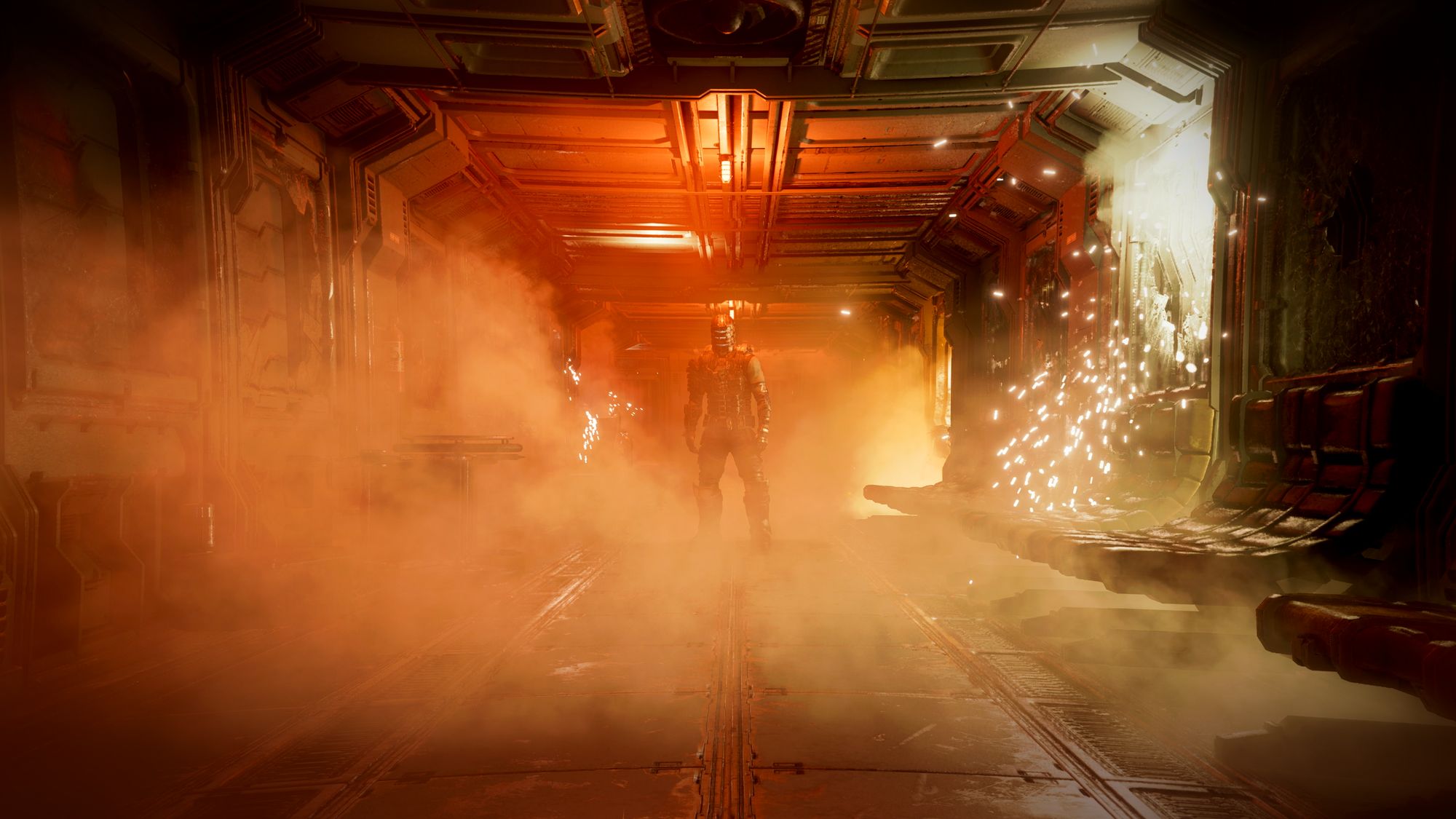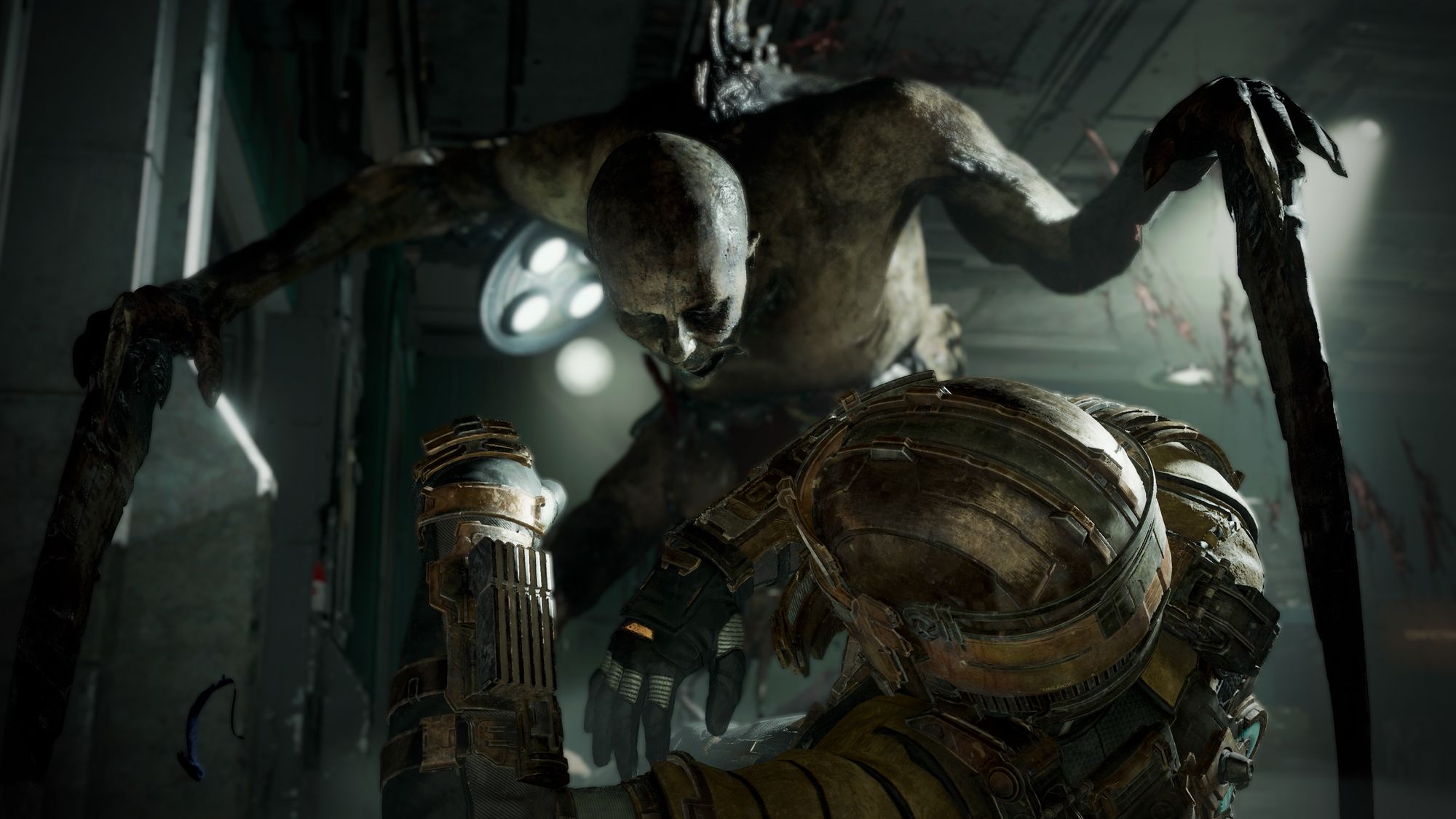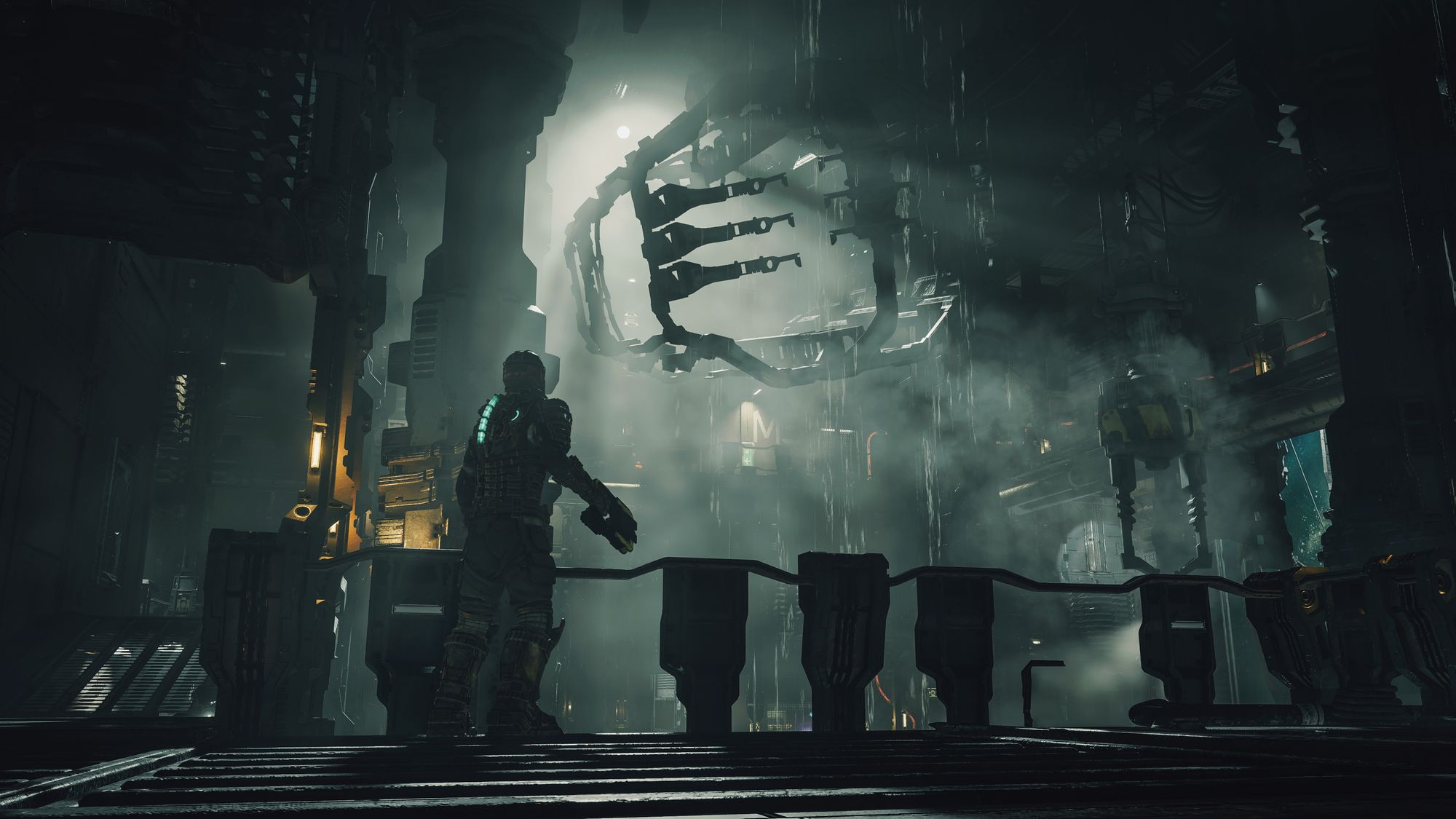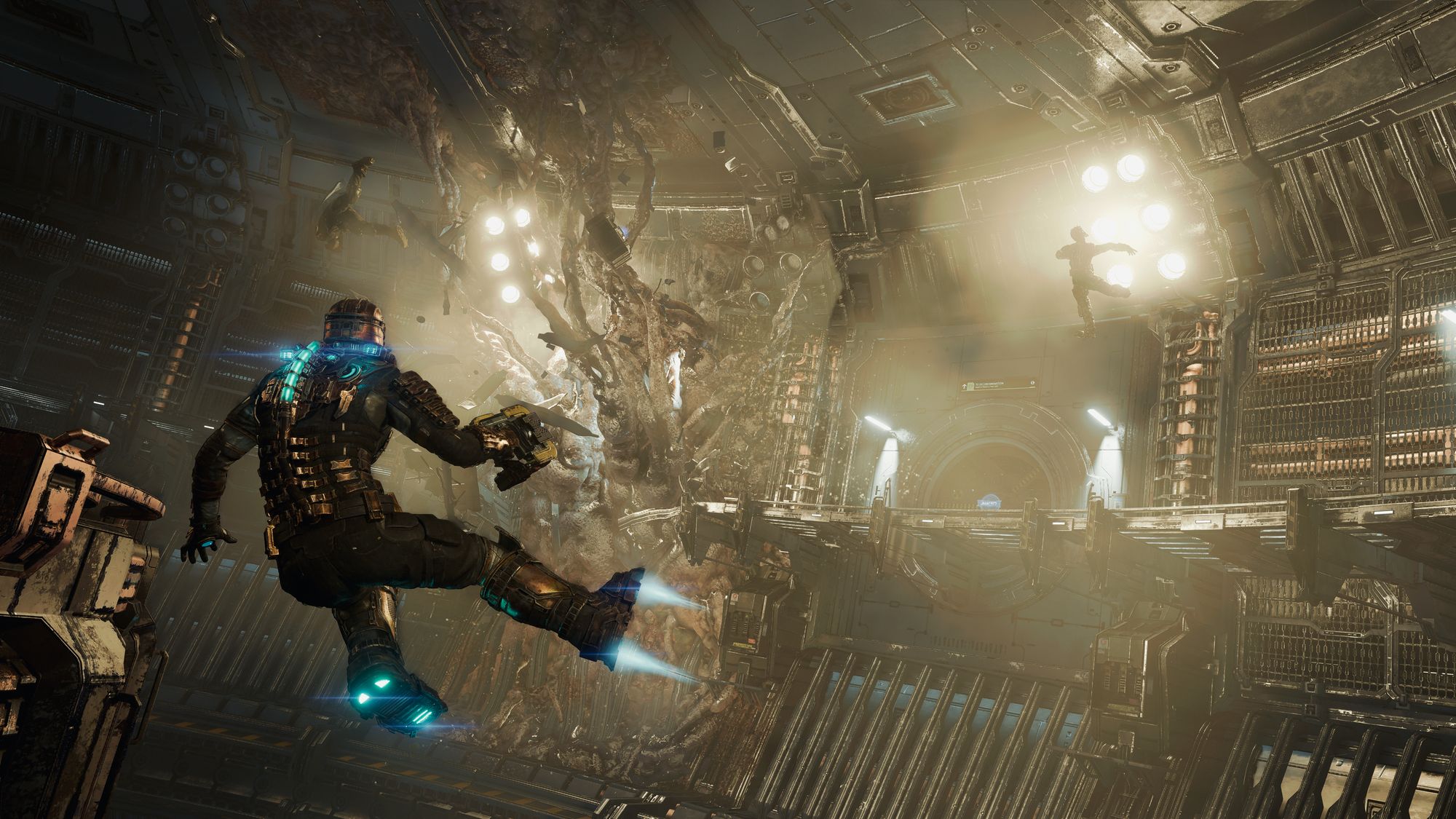
GameCentral plays the opening hours of the Dead Space remake and talks to its creative director about the past and future of survival horror.
The summer never sees many new video game releases but this year was made so much worse because there were so few announcements or previews, with and Gamescom no longer even a shadow of their former selves. For some reason though, this month has seen a sudden flurry of hands-on events, but see if you can spot the connection between the last three we’ve attended, for Dead Space, 4, and The Callisto Protocol…
Over the next few months, fans of third person survival horror are going to be feasting like never before, and while we can’t talk about the other two games just yet we can tell you what we thought of the Dead Space remake, including our interview with creative director Roman Campos-Oriola.
The three games are connected by more than just genre, since The Callisto Protocol is a spiritual sequel to Dead Space, by its original creator, and the original Resident Evil 4 is the game which inspired Dead Space itself – since the two titles released only three years apart.
The task of remaking Dead Space has been given to EA’s Motive Studio, who were behind the excellent and the story campaign of Battlefront 2. The idea of doing a remake was no doubt inspired by the success of Capcom’s Resident Evil 2 and 3 but rather than having to reinterpret the originals with modern technology the basic design of Dead Space is still viable.
The plot involves the crew of a deep space mining ship being transformed into monsters named necromorphs, which are very hard to kill unless you cut off their limbs first. Whether Dead Space counts as a genuine classic has always been a matter of debate amongst horror fans, and its debts to not just Resident Evil but movies like Alien, Event Horizon, and The Thing are both obvious and numerous. Originality is not Dead Space’s strong point, but atmosphere and tension are.
We played several hours from the start of the game and it’s fascinating how the original design and the new visuals both manage to impress in their own way. You play as an engineer named Isaac Clarke, who unlike in the original now has his own voice and dialogue. He’s invested in the story not just because he’s stuck on a ship filled with space zombies but because his girlfriend is also somewhere on the same vessel.
Unlike Resident Evil 4, the original Dead Space allowed you to move and shoot at the same time. Obviously, that novelty has disappeared over the last 14 years but while the basics of the movement and combat system are no longer unusual the way you have to deal with the necromorphs is, as you angle your shots between vertical and horizontal and try to preserve precious bullets until you can do real damage to remove the creatures’ limbs.

The map layouts are essentially the same as the original, with only a few new additions, but there are new features beyond just the graphics and we were very impressed by the breaker concept, where you have to switch power to different sub-systems, such as the lighting or lifts. Switching off the lights in a survival horror is clearly never a good idea but what we didn’t realise when playing, but was explained in the interview, is you can actually switch off more than you need if you want to make an ad hoc hard mode.
We weren’t quite that masochistic but it’s an excellent system, that suggests Motive are definitely the right people for the job. Although we were a little disappointed to find that the new zero-G elements, that weren’t in the original but are inspired by Dead Space 2, don’t use proper physics, so when you fire a gun it doesn’t push you backwards.
And while the volumetric fog looks great the amount of gibbage from dead necromorphs can start to get a bit silly. The ground ends up covered in dismembered carcasses, but they seem to have no weight to them, and you kick them around the ground like semi-deflated balloons. Perhaps that will change before the game’s final release, because otherwise everything else seems very impressive, with enemies having a new ‘peeling system’ that sees skin and bone being ripped from their flesh.
Despite a few quibbles, this is a remake that will please new and old fans in equal measure. It’s proof that not only is Dead Space worthy of being remembered, and continued, but that survival horror itself is as compelling now as it’s ever been.
GC: You must be one of the few people that isn’t confused over the difference between a remake and a remaster.
[laughs]
GC: There can sometimes be a little bit of grey area, but how would you define the difference?
RCO: There’s a gradient, but for us the main difference is that it’s a remake in the sense that we completely rebuilt it. It’s a different engine and all the assets have been remade, all the textures…
GC: Do you keep anything from the original, things like the AI maybe?
RCO: No. Everything was fully remade. And, of course, we’re looking at the original or at some point in production we were using some original assets as placeholders. But we really had, like… 14 years, it’s a long time in video games. [laughs] So we had to rebuild everything, to leverage the improvements we wanted to push in the game.
GC: I was always fascinated by the , which were really good but they didn’t have any original code at all; they just had to look at the game and figure out how it worked.
RCO: So, about the original code, we had the original, all the originals. It was quite an old engine and the way it was crafted, it was… So yeah, we were looking at the original; we had all the original data, the animations, the assets, etc. All of that.
GC: I’m curious how you recruit for this. An original project evolves at its goes but here you know the end result already, so did you just look within EA and see who was a Dead Space fan?
RCO: I was not even at EA! [laughs]
GC: I’d hate to think they pulled in some poor soul whose favourite game was Animal Crossing, to work on this.
RCO: [laughs] No, they called me! Personally, I’m a big fan of survival horror and I really love Dead Space, so working on the remake of Dead Space… that, for me, was a no-brainer. Mike [Yazijian, the art director, who’s also present] worked on the franchise before.
MY: Yeah, I mean, this was an easy one for us. At the studio, years ago, I was art director on Dead Space 2. When I heard about this I was like, ‘Oh, this is a dream come true. I cannot believe that we’re gonna do this!’ So it was super exciting to be part of it. And, you know, the team that we have back home, they were thrilled. They’re big fans, they were like ‘Sign us up, we want to work on this!’ So it was not hard to get people to join the project.

GC: Do you know where the original idea came from? Because EA has had a, uh, troubled relationship with single-player games over the years, but they currently seem all for them. Was this project part of a general edict to make more single-player games or was someone high up a Dead Space fan?
RCO: So, basically, the initial spark was the MD of the Montreal Studio that was looking for things after Star Wars. And he was a fan of survival horror and Dead Space. And that pushed the project, originally, for the studio.
GC: I assume we’re all horror fans here.
All: [mumbles of agreement]
GC: I love them but the thing I can’t help but notice is that they almost never sell in big numbers, even Resident Evil isn’t that big and something like Silent Hill… I bought it but I don’t think anyone else ever did.
RCO: I bought Silent Hill! [laughs]
GC: So there’s two of us! But seriously, there’s a lot coming up at the moment, but that’s happened before – I remember the supposed survival horror renaissance around Alien Isolation and The Evil Within – but in the end none of them made much of impact. Do you think this time it’ll be different?
RCO: You’re always concerned because you don’t know… what I’m seeing, at least in my personal opinion, at the moment is that as a genre, horror media is becoming… not necessarily more mainstream but it has definitely much more awareness than it previously had.
I remember being forced to find the one cinema in town that was projecting horror movies, like 15 or 20 years ago. Now any relatively medium budget horror movie will have a nationwide release. Same thing with horror on TV and this kind of thing. You could argue whether or not Stranger Things is horror but definitely it leans heavily into the direction of horror.
GC: There’s certainly more horror than I imagined there would be.
RICO: The first two seasons, for sure. And it’s Netflix’s flagship series! And it’s getting the same in video games. A video game like The Last Of Us/Last Of Us 2 you could argue is it really a survival horror or action adventure? Eh, it’s somewhere in between. But again, it’s adding more to the overall genre. Is it gonna stop after Resident Evil 4 remake? [laughs] I dunno, we’ll see. But for me, personally, I see that trend moving forward. I see it – maybe I’m wrong – but I see it growing.
GC: It does seem to me that Dead Space has it particularly hard because Resident Evil can be funny and goofy, which makes it more accessible, but Dead Space is grim and scary basically 100% of the time.
MY: Right.
GC: There’s not really any humour and it can be very oppressive. Is that something you sought to mitigate at all with the remake?
RCO: We’ve thought about cranking things up more than turning it down. Like, for example, with the gore or the ambiance with the lights. My personal opinion is that Dead Space has some unique strengths to it, in the setting and also in the type of things that it’s reaching in terms of horror.
Dead Space has that unique mix of sci-fi, space zombies, and psychological horror. And usually you don’t have all three of those. If you think about Event Horizon, it has sci-fi and psychological horror. If you think about Alien, it has sci-fi… it’s not exactly space zombies, but let’s say space monster – but it doesn’t have that element of psychological horror.
Resident Evil, that definitely has the monsters, but it doesn’t have sci-fi, doesn’t really have that psychological element. So for me, those are the strengths of Dead Space, it’s that it’s a really unique mix. And so that’s what we wanted to push. That’s the type of pillars, also in terms of narrative, that we reinforced, on the psychological aspects and the paranoia – to make sure that we were properly portraying the Dead Space experience.
GC: That’s true, but I would say that also hints at its one conceptual weakness, in that its influences are very, very obvious. It’s almost a Frankenstein’s monster of other games and films.
RCO: Personally, the way I see horror, what’s interesting for me in the genre… because that type of critique, I think you can give the exact same to any Resident Evil.
GC: It’s a critique, but it’s not necessarily a criticism.
RCO: No, it’s not necessarily a critique in a negative way. That type of analysis, you can have it on any horror game, I think. Because I think it’s something that lies at the foundation of horror. All horror is based on some storytelling tropes and then it’s about taking those tropes and really pushing something specific to your story. And there’s just so many things that really scare people.
It’s dark. Yeah. There’s monsters. Yeah. It’s what can happen to you and it’s body horror. It’s like… what scares you as a human being? It’s pretty well categorised, if I can say. So coming back to what’s interesting in Dead Space… the mix of elements that are scary in Dead Space are pretty unique.
And yes, there are some elements that’s coming from Alien, some elements coming from The Thing, some elements coming from Event Horizon, but it’s playing on the same type of element of horror that’s the same way as zombie movies.
Is there a lot of things based on John Romero’s films? Yeah! They run, they used to walk. Okay, cool. You see what I mean? It’s because horror as a genre is built on what really scares us. And again, you’re afraid of losing your sanity, you’re afraid of what can happen to your body.
GC: I think the only other general criticism of Dead Space is that it’s the quintessential example of something that happens in a lot of games, not just survival horror, where you’re constantly running around fixing things according to the demands of someone talking to you through a headpiece. Is that something you tried to tone down at all in the remake?
RCO: So it’s a balance. There are some elements that we improved or that we try to improve. It mainly has to do with the type of agency we give to the main character. And so, one of the reasons we gave Isaac a voice is that even if most of the objectives are similar to the original the way your character approaches them, the way they get presented to you is with much more urgency from the character.
It’s not just: ‘Oh Isaac, I see that’s something in front of you. You should go grab that and that and blow it up.’ Now it’s a small discussion with your character and you’re part of the plan. You’re not just being told what to do. So, the way it’s presented to the player, for me, it’s much more immersive in that sense.
The other element is we try to give more tools to the player. And so that’s one of the reasons, for example, for the wall breaker system and why you get some level of control on the survival element of the ship.
It’s like, ‘Okay, now you’re asked to reactivate that. Okay cool.’ Do you prefer to do it in a vacuum or do it in the dark? Or maybe go super hard mode and do it in the vacuum in the dark. It’s giving a bit more urgency to the player and to the character on how to solve those issues.
And sometime we embrace the tropes of the original, but just by lifting up the ambiance and using dynamic lighting and 3D fog, really pushing it further like, ‘Oh yeah, I’m just flipping that switch on.’ But it’s really scary to flip that switch on.
GC: I really liked the breaker system because there’s a meta element there where you know, as a player, that if you turn off the lights in a survival horror something bad is going to happen.
RCO: You’re afraid that something might happen.

GC: The other thing that I noticed was, because it’s an old game, the room sizes were quite small – the level design was the one area that hinted at the game’s age. Did you worry that might be an issue, that you might have to increase the size of rooms or redesign them?
RCO: For me, I don’t consider that as a problem because it’s a spaceship. And so for me, that’s one of the strengths of Dead Space, is that there are those elements of you are lost in space, those elements of isolation. And in order to create that ambiance you need to believe that you are in the spaceship, you need to believe that you are lost in the middle of space with all these monsters. And so those elements of claustrophobia and being stuck inside that spaceship with those monsters, those are the elements that are making Dead Space scary and unique.
And what we did in term of structure, to try to reinforce that, is to make the player believe more in the fact that it’s an actual spaceship. And so by removing the loading, by repositioning the different decks of the spaceship and having a structure that actually makes sense, with the different decks and what each deck of the ship is for and how it connects to each other… what we are trying to do is really reinforce that feeling of immersion and the believability of the ship. And if we’re succeeding in that, that’s how it creates that claustrophobic atmosphere.
GC: I didn’t want to lead the question there, but yes, I agree. It still works.
RCO: [laughs]
GC: I think the only new element I wasn’t necessarily a fan of was the zero-G sequence, because when you fire your gun, you don’t get pushed back. I guess I know why you did that, but couldn’t you at least have put it in as a hard mode or something?
RCO: So for the zero-G, in the original it was not working at all like that.
GC: No, I know.
RCO: It was walking on walls and stuff. So we decided to improve the immersion and go the Dead Space 2 way. But in terms of, let’s say playability, of the zero-G exploration we wanted to keep a nice balance between believability and immersion and how the world reacts when you’re in zero-G and the type of gameplay we wanted to have.
And so for us, what’s interesting when you’re in zero-G, it’s the element of it’s not anymore just in front or behind you, it can be above or below you too. And that’s the element we wanted to play with. And so that’s why we are pushing the sounds to be able to orient yourself toward your target. We did not want it to stress the controls for the player when you are in zero-G.
GC: And my other pet peeve, and apparently I’m the only person in the world that feels like this, because developers keep using them, is I hate audio logs. I hate them, they’re so weird and unrealistic. Have you ever known anyone in real life to ever make a log like that?
RCO: [laughs] For me, as a narrative tool, what is really interesting is that it allows us to deliver a story to the player, or elements of story to the player, while not interrupting the gameplay element. And so it reinforces the environmental storytelling. And where it gets really interesting is when the level around you tells you part of that story.
So you get that guy, you are in a room, you get that guy that is fully dismembered. Usually in that spaceship people tend to get dismembered and when you listen to his audio log you understand that it’s not a monster that killed him, it’s himself. He did not want to change into those monsters. And the way he decided to kill himself was to cut off his own limbs because this way he would not come back as a monster and kill his friends.
And so when there is synergy between audio logs, environmental storytelling, and the gameplay, for me, that’s where that tool becomes really interesting. And that’s one thing that really interests me with the way audio logs are treated in Dead Space, is that it allows you to reinforce that environmental storytelling while you still have access to gameplay. And for me, that’s really important in the game.
GC: I don’t know whether to ask this question sarcastically or not, but did you ever think of putting co-op in the game? People don’t like Dead Space 3 but they don’t necessarily not like co-op.
RCO: For us, really the focus was to recreate the experience of the original. Not like it was but like you think you remember it, that glorified memory of the original.
GC: That’s a good point. That’s why remasters often disappoint, because they only keep pace with your memory and so it seems like they haven’t really improved at all.
RCO: Yes! That’s why we had that strategy with trying to have people from the community from the beginning, being transparent with them to try to make sure because… ‘Yeah, okay, we’re a big fan of Dead Space but the way we remember Dead Space is not always the same.’ Okay, so let’s figure what are the common points.
And that’s also our strategy with livestreams. The sound of the plasma cutter, we all thought it was great. But then the last stream we got feedback on that, and we iterated on that. So really our goal was to get that glorified memory.
GC: OK, that’s great. Thanks a lot for your time.
RCO: No problem, thank you.
Formats: PC (previewed), Xbox Series X/S, and PlayStation 5
Publisher: EA
Developer: Motive Studio
Release Date: 27th January 2023
Email [email protected], leave a comment below, and .
Follow Metro Gaming on and email us at [email protected]
To submit Inbox letters and Reader’s Features more easily, without the need to send an email, just use our .
For more stories like this, .




















